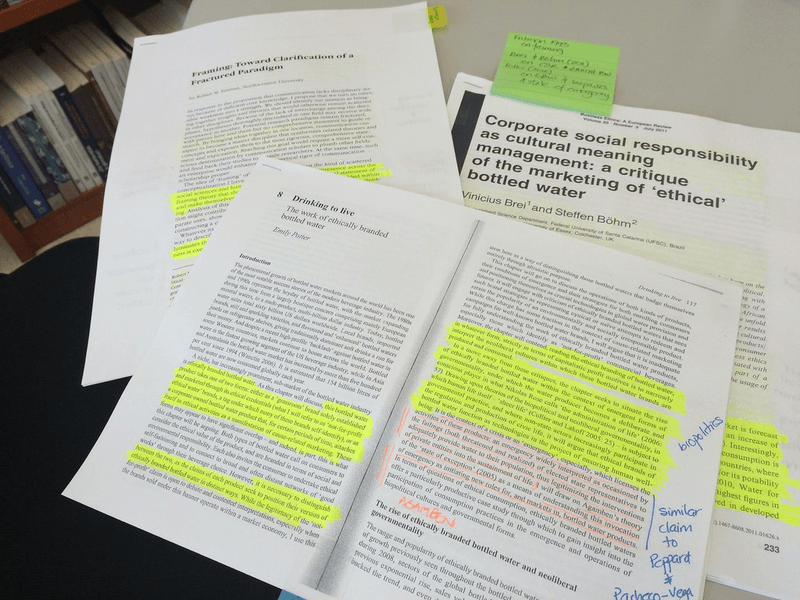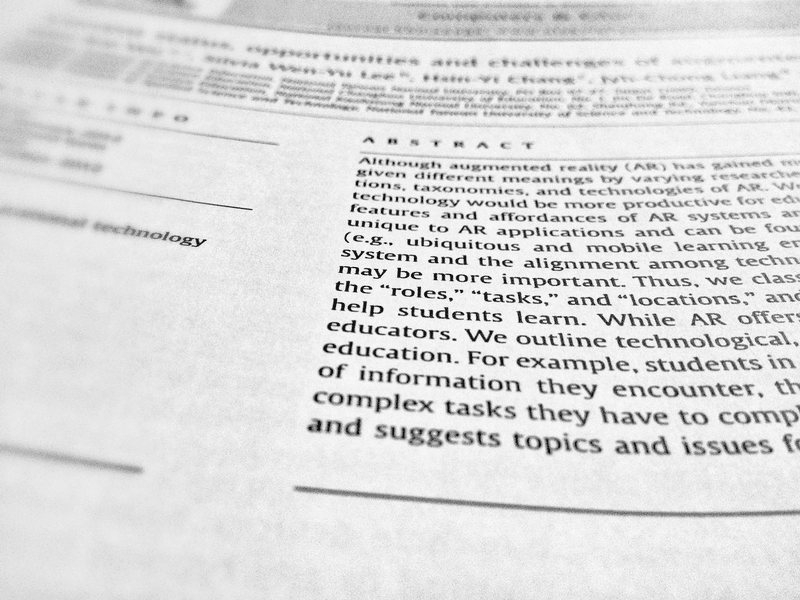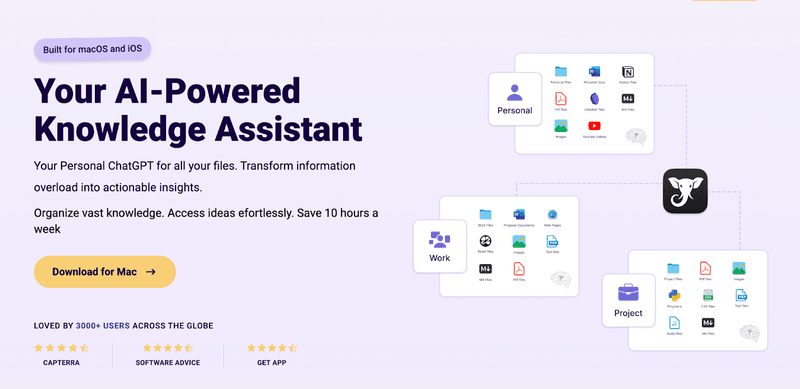How to Use AI for Literature Review (2026): Complete 7 Step Guide for Researchers
Literature reviews are a crucial yet time-consuming part of academic research.
With the advent of artificial intelligence (AI), researchers now have tools that can significantly streamline this process. This guide explores how AI can be effectively utilized to enhance and accelerate literature reviews.
We'll cover the following key aspects:
- The role of AI in literature reviews
- Specific AI tools designed for academic research, such as Elephas
- Best practices for integrating AI into your research workflow
- Potential benefits and limitations of AI-assisted literature reviews
Whether you're a seasoned researcher or a student embarking on your first major project, this guide will provide practical insights on leveraging AI to improve your literature review process.
So let's get started.
What is a Literature Review and Why Does It Matter?

When researchers start a new project, they don't just jump in blindly. They first look at what others have already figured out. That's where a literature review comes in handy.
It's like piecing together a puzzle. You gather all the bits of information from different studies, articles, and books. Then you start to see the big picture. What do we know so far? Where are the gaps? Are there any hot debates going on?
All these will translate to
It connects their work to the bigger conversation in their field
It stops researchers from reinventing the wheel
It helps them spot new angles to explore
It shows they've done their homework
By digging into existing research, scholars can push knowledge forward. They're not starting from scratch, but building on what's already there. Plus, a good literature review is super helpful for other researchers too.
It gives them a quick way to catch up on a topic without having to read through piles of separate studies. This saves time and helps guide future research efforts.
Different Types of Literature Review

Literature reviews can take on various forms depending on their purpose and approach. Below are some of the most popular types of literature reviews:
Narrative Review:
This review gives a broad summary of existing studies on a topic but doesn't adhere to a rigid structure. It's often used to provide general insights without analyzing the specifics deeply.Systematic Review:
A systematic review follows a well-defined method to gather, assess, and interpret all available research on a particular question, aiming to reduce bias and provide a more accurate picture of the subject.Meta-Analysis:
This method uses statistical techniques to combine findings from several studies. The goal is to derive a stronger conclusion by merging the data and providing more robust results.Scoping Review:
A scoping review maps out the main ideas and gaps in a field of research, helping to identify where more studies are needed and suggesting potential directions for future research.Critical Review:
This type of review critically examines the strengths and weaknesses of existing research, offering new perspectives or challenging previously accepted theories.
Well, each type offers unique insights based on the research objective, shaping the direction of further inquiry of the research.
Step-by-Step Guide on How to Use AI for Literature Review
Using AI for literature review can significantly streamline your research process. Let's explore two methods: a multi-tool approach and using Elephas, an all-in-one assistant.
Method 1: Using Multiple AI Tools for Literature Review

1. Identify Your Research Topic and Keywords
The first step is defining your research area. Use Perplexity AI for topic exploration and generating research questions. This AI tool helps you uncover new angles for research topics by analyzing vast amounts of data quickly.
2. Search for Relevant Articles
Start your literature search by heading to Elicit.org. Export the articles based on categories like abstract, author, title, and publication date. You can also use other AI-powered search tools like Semantic Scholar or Google Scholar to broaden your sources.
3. Generate Summaries and Key Themes with GPT-4o
After gathering your articles, use GPT-4o to analyze the abstracts and generate key themes. Input the abstracts with prompts like, “Please summarize the key themes from these articles.” This step saves hours of manual reading and gives you a thematic overview.
4. Draft an Initial Literature Review with Copy.ai
Use Copy.ai to create a first draft of your literature review. Its AI-powered writing features allow you to generate sections of the review quickly and in a structured format. Copy.ai can assist in writing specific sections, such as background or methodology, based on the keywords and themes you provide.
5. Refine with Smart Writing Tools
Use AI tools like Jasper or Writesonic to refine your literature review. These tools help to paraphrase content, improve readability, and adapt the tone to meet academic standards. The rewrites from these tools can help make the content more engaging and coherent.
6. Organise References Using Reference Managers
As you finalise your draft, integrate reference management tools like Mendeley or Zotero. These tools can store and organise all the references cited in your paper, and AI integration allows for easy reference generation.
7. Use Perplexity AI for Final Checks
Before submission, use Perplexity AI again to check for any gaps in the research or identify potential new areas to explore. It can provide suggestions based on the latest publications and research trends.
Method 2: Using Elephas for Literature Review

Elephas offers an all-in-one solution for conducting literature reviews. Here’s how you can use it:
1. Search the Web with Elephas
Elephas’ web search feature allows you to find relevant articles directly within the tool. Simply input your research terms, and it will pull up related papers, articles, and sources for you to analyse.
2. Analyse Key Themes
Using integrated AI models like GPT-4 or Claude, you can analyse the abstracts or summaries of these papers to identify key themes.
3. Generate a Literature Review
With Elephas’ Smart Write feature, you can create a well-structured literature review in just a few prompts. It pulls in the key themes and drafts a coherent review, ensuring that all relevant abstracts are referenced accurately.
4. Organise with Super Brain
Elephas’ Super Brain feature helps you manage the knowledge from the papers, documents, and research you’re using. It organises and categorises the data for easy access during the writing process.
5. Refine and Customise Tone
Elephas allows you to refine the review by using its multiple writing modes (Zinsser, Friendly, Professional, or Viral Mode). You can ensure that the literature review matches your preferred tone and style.
6. Manage References and Citations
With the help of Super Brain, you can manage references and citations within the text, simplifying the process of creating a bibliography.
By using Elephas, you can significantly speed up the literature review process while maintaining high quality. It’s a comprehensive all-in-one AI tool, making it one of the best solutions for conducting literature reviews.
Advantages of Using AI for Literature Review

AI is changing the game for researchers tackling literature reviews. Now, we've got smart tools that can do a lot of the heavy lifting for us. Let's explore some advantages of using AI for literature review.
Time Efficiency: AI dramatically speeds up the review process. It can analyze thousands of articles in minutes, a task that would take humans days or weeks to complete.
Comprehensive Coverage: AI can thoroughly scan vast databases, ensuring no relevant study slips through the cracks.
Pattern Recognition: AI literature tools excel at identifying trends and connections across multiple studies, often spotting insights that humans might overlook.
Bias Reduction: AI approaches each piece of literature objectively, helping to minimize human biases that can creep into manual reviews.
Multilingual Capabilities: Language barriers become less of an issue. AI can process and analyze research in multiple languages, broadening the scope of reviews.
Data Visualization: Many AI tools can generate clear, insightful visualizations of complex data, making it easier to grasp key findings at a glance.
Continuous Updating: In rapidly evolving fields, AI can keep literature reviews current by continuously incorporating newly published research.
While AI brings these impressive benefits to the table, it's important to remember that it's not a wise move to use AI extensively and limit your human touch in the review.
The ideal approach is to combine AI with your critical thinking and domain knowledge. As AI technology continues to advance, its role in streamlining and improving literature reviews is only set to grow, opening up exciting new possibilities for more comprehensive and efficient research processes.
Manual Literature Review vs AI Literature Review
In the world of research, literature reviews play a crucial role. They help researchers understand what's already known about a topic and identify gaps in knowledge. Today, we're seeing a shift in how these reviews are conducted, with AI tools coming in and helping researchers to reduce their overall workflow. But what is actually better: manual literature review or AI-assisted literature reviews?
The Traditional Approach: Manual Literature Review

Manual literature reviews have been the standard for a long time. Here's what they typically involve:
They take detailed notes on each source
Researchers spend hours reading through papers and articles
Key themes and patterns are identified through careful analysis
Connections between different studies are made based on the expertise
This method has its strengths. It allows for deep understanding and critical thinking. Researchers can pick up on subtle nuances that might be important. However, it's also very time-consuming and can be limited by the researcher's ability to process large amounts of information.
The New Kid on the Block: AI Literature Review

AI-assisted literature reviews are changing the game. Here's how they work:
AI tools can quickly scan thousands of articles
Key themes and patterns are automatically extracted
They use advanced algorithms to identify relevant studies
Connections between studies are made based on data analysis
The speed and efficiency of AI reviews are impressive. They can process far more information than a human could in the same amount of time. This means researchers can get a broader view of their field quickly. AI tools are also great at spotting trends and connections that humans might miss.
Comparing the Two Approaches
When we look at manual and AI literature reviews side by side, we see some interesting differences:
Time efficiency: AI is much faster, potentially saving weeks of work
Scope: AI can cover a broader range of sources
Depth of analysis: Manual reviews often provide deeper insights
Bias: AI can help reduce human bias, but may have its own algorithmic biases
Flexibility: Manual reviews can adapt more easily to unique research needs
Language: AI can work across multiple languages, expanding the scope of research
It's important to note that AI isn't perfect. It might miss context or nuances that a human would catch. That's why many researchers are now using a hybrid approach.
They use AI to do the initial heavy lifting, then apply their own expertise to refine and interpret the results.
In the end, whether manual or AI-assisted, the goal of a literature review remains the same: to build a solid foundation for new research and contribute to the advancement of knowledge in the field.
Common Concerns and Misconceptions About AI in Literature Review

There are many concerns and misconceptions about using AI in literature reviews. It's natural to have doubts about new technology, especially when it comes to something as crucial as research.
One big worry is that AI might replace human researchers. But that's not really the case. AI is a powerful tool, but it can't match the critical thinking and deep understanding that humans bring to the table, at least for now. It's more of a helper than a replacement.
Accuracy Concerns: There's a misconception that AI might misinterpret or miss important information. Modern AI tools are actually quite accurate, but they do need proper setup and oversight to perform at their best.
Over-reliance on Technology: Some worry researchers might become too dependent on AI, losing their own analytical skills. In reality, AI frees up time for deeper analysis and creative thinking.
Data Privacy Issues: Concerns about data security and privacy are valid. It's crucial to use AI tools that adhere to strict data protection standards.
Limited to Quantitative Analysis: Many think AI can only handle numbers and statistics. Actually, advanced AI can process qualitative data too, including complex text analysis.
High Costs: While some AI tools can be expensive, many affordable options exist. The efficiency gains often outweigh the initial investment.
Complexity of Use: There's a belief that AI tools are too complicated for the average researcher. In fact, many are designed with user-friendly interfaces.
Things to Keep in Mind While Using AI for Literature Review
When using AI for literature reviews, there are several key points to keep in mind. Let's check out these important considerations that might get you into trouble if not checked properly when using AI for a literature review.
Quality Control: While using AI, you need to always double-check the results it generates. Take the time to review the selected articles and ensure they're truly relevant to your research.
Ethical Considerations: The use of AI in academic work is still a hot topic. Be mindful of ethical concerns, particularly around plagiarism and AI-generated content. Make sure your work is original and properly cited.
Stay Updated: Keep an eye on the latest developments in AI tools for literature reviews. What's new in the AI market and what’s outdated will help inform you to make the most of these tools.
Define Clear Parameters: Be specific about your research questions, keywords, and inclusion criteria. The more precise your input, the more relevant your results will be.
Understand AI Limitations: AI is great at processing large amounts of data, but it might miss nuances or context that a human would catch.
Maintain a Critical Perspective: Don't accept AI-generated summaries or analyses at face value. Apply your critical thinking skills. Question the results, look for potential biases, and consider alternative interpretations.
Document Your Process: Keep detailed records of how you used AI in your review. Note which tools you used, what parameters you set, and how you verified the results. This transparency is vital for the credibility of your work.
These tips may be generic and known to everyone, but many researchers, while using AI in their literature writing or revising process, still make these mistakes. Using AI is not wrong, but it's about finding the right balance between technological assistance and human expertise.
Conclusion
You know, it's pretty amazing how AI is shaking things up in the world of research. If you're knee-deep in literature reviews, learning to use AI could be a game-changer for you. It's like having a super-smart assistant who never gets tired and can spot connections you might miss.
There are a bunch of ways to go about it - you could mix and match different AI tools, or go for an all-in-one solution. The trick is finding what clicks for you. Just remember, AI is incredibly helpful, but it's not all good. You've still got to bring your expertise to the table.
As AI keeps evolving, it's opening up new possibilities for research. Who knows what breakthroughs we might see? So, getting comfortable with AI for literature reviews now could really set you up for the future.
It's an exciting time to be a researcher, that's for sure!
FAQs
1. Can GPT-4 do a literature review?
Yes, GPT-4 can help with a literature review by summarizing research papers, analyzing content, and identifying key themes. It speeds up the process by offering relevant insights from sources, but human expertise is still needed to ensure accuracy and a comprehensive understanding.
2. Can you use AI to do a literature review?
Yes, AI can assist in conducting a literature review by automating tasks such as summarizing research papers, analyzing large amounts of data, and highlighting important findings. This aids in streamlining the review process, although human judgment is essential for interpreting and validating the results effectively.
3. What is the AI tool to summarize the literature review?
AI tools like Elephas, designed for summarizing literature reviews, help streamline the process by providing features such as offline support, multiple language models, and web search integration. These tools can quickly summarize key insights and trends across academic papers and other research sources.

Comments
Your comment has been submitted